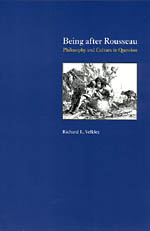
The Rousseauian tradition begins, for Velkley, with Rousseau's criticism of modern political philosophy. Although the German Idealists such as Schelling accepted much of Rousseau's critique, they believed, unlike Rousseau, that human wholeness could be attained at the level of society and history. Heidegger and Nietzsche questioned this claim, but followed both Rousseau and the Idealists in their vision of the philosopher-poet striving to recover an original wholeness that the history of reason has distorted.
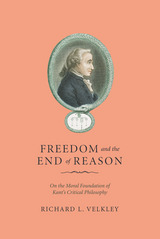
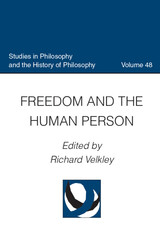
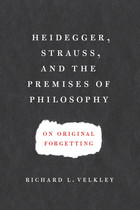
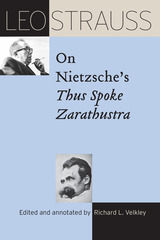
With Leo Strauss on Nietzsche’s “Thus Spoke Zarathustra,” eminent Strauss scholar Richard L. Velkley presents Strauss’s lectures on Zarathustra with superb annotations that bring context and clarity to the critical role played by Nietzsche in shaping Strauss’s thought. In addition to the broad relationship between Nietzsche and political philosophy, Strauss adeptly guides readers through Heidegger’s confrontations with Nietzsche, laying out Heidegger’s critique of Nietzsche’s “will to power” while also showing how Heidegger can be read as a foil for his own reading of Nietzsche. The lectures also shed light on the relationship between Heidegger and Strauss, as both philosophers saw Nietzsche as a central figure for understanding the crisis of philosophy and Western civilization.
Strauss’s reading of Nietzsche is one of the important—yet little appreciated—philosophical inquiries of the past century, both an original interpretation of Nietzsche’s thought and a deep engagement with the core problems that modernity posed for political philosophy. It will be welcomed by anyone interested in the work of either philosopher.
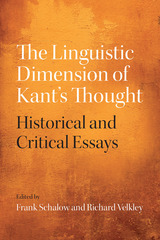
Among modern philosophers, Immanuel Kant (1724–1804) has few rivals for his influence over the development of contemporary philosophy as a whole. While the issue of language has become a key fulcrum of continental philosophy since the twentieth century, Kant has been overlooked as a thinker whose breadth of insight has helped to spearhead this advance.
The Linguistic Dimension of Kant’s Thought remedies this historical gap by gathering new essays by distinguished Kant scholars. The chapters examine the many ways that Kant’s philosophy addresses the nature of language. Although language as a formal structure of thought and expression has always been part of the philosophical tradition, the “linguistic dimension” of these essays speaks to language more broadly as a practice including communication, exchange, and dialogue.

Kant holds a key position in the history of modern philosophy as the last great figure to belong fully to both the Anglo-American analytic tradition and the Continental tradition. As the world's foremost scholar of Kant and German Idealism, Dieter Henrich combines an encyclopedic knowledge of Kant's texts with an equally profound understanding of the philosophers of preceding and succeeding centuries. In this collection comprising four of his most influential essays, Henrich proves himself unique in the conjunction of philosophical acumen, insight, and originality that he brings to Kant interpretation.
Henrich's distinctive contribution has been to break through the entrenched stereotypes of the ontological and neo-Kantian schools of Kant interpretation in order to place Kant's major ideas in their historical and developmental context, demonstrating their enduring philosophical significance. Henrich has shown how Kant's attempt to overcome the dichotomy between rationalism and moral-sense philosophy led to a lifelong struggle to establish the unity of theoretical and practical reason and the inseparability of the motivational force of the principle of ethics from its function as a principle for ethical judgment. But Henrich has also shown how Kant's project of unification contained fundamental tensions that called forth the projects of such post-Kantians as Schiller, Fichte, and Hegel, which explored new approaches within the Kantian framework.
The heart of Henrich's interpretation of Kant, the essays in this book present a persuasive picture of the development of Kant's moral philosophy and give an account of the argumentative strategies determining all the aspects of Kant's philosophy. They reflect Henrich's general interest in the unity of reason as well as his special interest in self-consciousness as both a key concept of modern philosophy and the key to the highly disputed interpretation of Kant's transcendental deduction of categories.
READERS
Browse our collection.
PUBLISHERS
See BiblioVault's publisher services.
STUDENT SERVICES
Files for college accessibility offices.
UChicago Accessibility Resources
home | accessibility | search | about | contact us
BiblioVault ® 2001 - 2024
The University of Chicago Press









